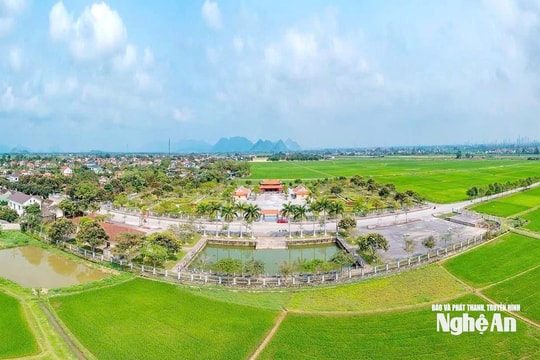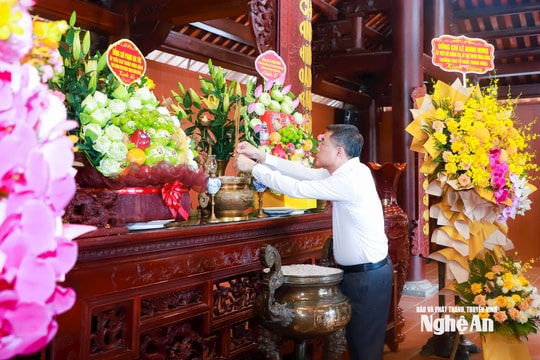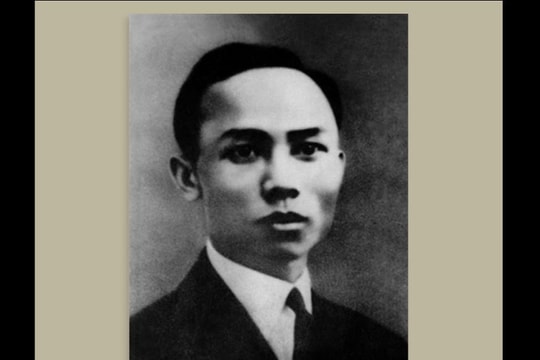General Secretary Le Hong Phong - a shining example of revolutionary ethics
(Baonghean.vn) - General Secretary Le Hong Phong, an excellent student of President Ho Chi Minh, a typical communist soldier. Comrade Le Hong Phong's life of activities and dedication to the Party, the revolution and the people, although short, left us a shining example of revolutionary ethics.
Comrade Le Hong Phong's real name is Le Huy Doan, born in 1902 in Thong Lang commune (now Hung Thong commune), Hung Nguyen district, Nghe An, in a peasant family. Born and raised in a rural area with a tradition of patriotism, with many famous scholars, witnessing with his own eyes the country's misery, the oppressed and exploited working people, Le Hong Phong soon nurtured in himself the ideology of patriotism and the will to make a revolution.
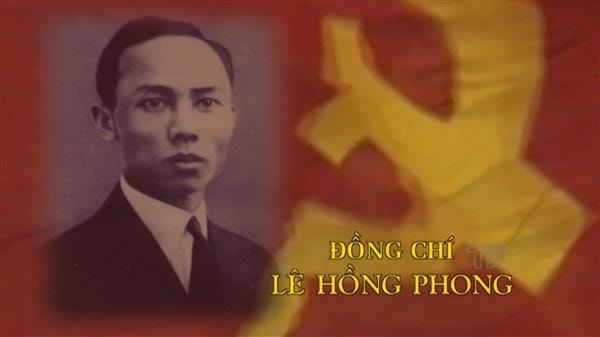 |
| General Secretary Le Hong Phong (1902-1942). Photo archive |
After finishing elementary school, Le Hong Phong left the village for the city, first in Vinh, then Ben Thuy, living as a hired laborer. Unable to bear the exploitation and oppression of the employers, Le Hong Phong and those with the same passion mobilized the workers to rise up and fight. For that reason, Le Hong Phong was fired from his job.
At the end of 1923, Le Hong Phong and his close friend Pham Hong Thai secretly went to Siam (Thailand) to meet Vietnamese patriots. In 1924, Le Hong Phong went to Guangzhou (China) to join the Tam Tam Xa group and then met leader Nguyen Ai Quoc, who enlightened him about the Marxist-Leninist revolution. From then on, Le Hong Phong was determined to follow leader Nguyen Ai Quoc's path to save the country.
In 1925, Le Hong Phong joined the Vietnam Revolutionary Youth Association and attended a cadre training class organized by leader Nguyen Ai Quoc, becoming one of the first leaders of our country's revolution.
He received comprehensive military and political education at the Whampoa Military School, the Air Force School in Guangzhou (China), the Military Theory School of the Soviet Air Force in Leningrad, and the Military Pilot Training School in Borisolepsk (Soviet Union).
After graduating, Le Hong Phong worked in the Soviet Red Army and was responsible for liaison between the Indochinese Communist Party and the Communist International. During this time, he systematically studied revolutionary theory at the Communist International's Oriental University in Moscow, graduating from the 3-year course (1928 - 1931), then continued his first year of graduate studies.
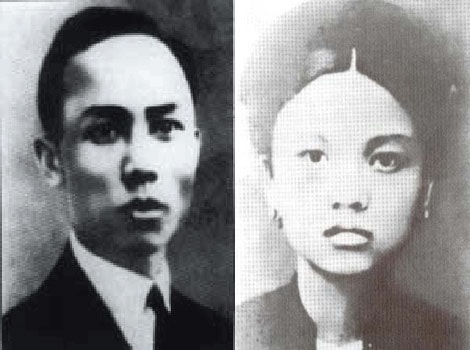 |
| Comrade Le Hong Phong and Comrade Nguyen Thi Minh Khai. Photo archive |
After the Nghe-Tinh Soviet movement (1930-1931), due to the savage and brutal terror of the French colonialists, the Vietnamese revolution encountered numerous difficulties and suffered heavy losses. In that situation, in November 1931, following the directive of the Communist International, Le Hong Phong returned to the country to lead the restoration and development of the Party organization, helping the Indochina revolution overcome the difficult and dangerous period.
In early 1932, when arriving in Nanning city, Guangxi (China), Le Hong Phong connected with loyal comrades and together outlined the Party's Action Program, which was approved by the Communist International.
In March 1934, Le Hong Phong and a number of comrades held a conference to establish the Party's leadership committee abroad (at that time called the Party's overseas command committee). The overseas command committee functioned as a provisional Central Executive Committee with comrade Le Hong Phong as Secretary and comrade Ha Huy Tap as member in charge of propaganda work.
The Command Committee outside prepared and decided to convene the First Congress of the Party in Macau (China) from March 27 to 31, 1935. The Congress passed the Political Resolution, the Party Charter, a number of other important documents and elected the Central Executive Committee of 13 members headed by comrade Le Hong Phong.
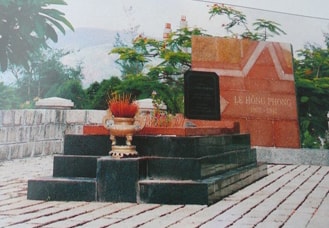 |
| Tomb of comrade Le Hong Phong at Hang Duong Cemetery, Con Dao. Photo courtesy |
At the end of 1934, Le Hong Phong led the Party delegation to attend the 7th Congress of the Communist International held in Moscow (Soviet Union) from July 25 to August 25, 1935. He presented an important report on the struggle of the peoples in Indochina and was highly appreciated by the congress. The congress passed a resolution recognizing the Indochinese Communist Party as an independent branch of the Communist International and elected comrade Le Hong Phong as a member of the Executive Committee of the Communist International.
In July 1936, in Shanghai, he convened and chaired the Central Conference to supplement the Resolution of the First Congress, directed the change of the Party's organizational and strategic direction, and advocated the establishment of a broad People's Anti-Imperialist United Front, including various forms of struggle and activities from secret, illegal to public, semi-public, legal, semi-legal, with the aim of "preparing conditions for the national liberation movement to develop", preparing in all aspects to bring the revolutionary movement to its climax from 1936 to 1939.
In November 1937, Le Hong Phong secretly returned to Saigon and, together with the Central Committee, actively directed the implementation of the Party's new strategic policy.
On June 22, 1939, Le Hong Phong was arrested for the first time by the French colonialists in Cho Lon and sentenced to 6 months in prison. On December 23, 1939, they brought him back to his hometown in Nghe An to be under house arrest. On January 20, 1940, he was arrested for the second time by the French colonialists and imprisoned in Lon prison, Saigon; at the end of 1940, they exiled him to Con Dao.
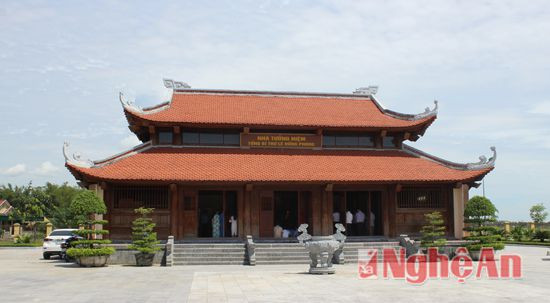 |
| Memorial house of General Secretary Le Hong Phong in Hung Thong commune - Hung Nguyen district. |
In Con Dao, knowing that Le Hong Phong was an important figure of the Party, the French colonialists tried every way to torture and brutally mistreat him. He still upheld his revolutionary spirit, did not reveal a word, and at the same time actively mobilized and directed fellow prisoners to fight against the enemy's beatings and against the harsh prison rules.
Due to his health gradually deteriorating due to revenge and illness, he breathed his last at noon on September 6, 1942 after leaving a message: "Please report to the Party that, until the last moment, Le Hong Phong still firmly believed in the glorious victory of the revolution."
Forty years old, twenty years of continuous, heroic and enthusiastic revolutionary activities, comrade Le Hong Phong devoted his whole life to the glorious revolutionary cause of the Party and the nation. He left behind a shining example of revolutionary ethics, love for family, homeland and country, sacrificing his whole life for the independence and freedom of the fatherland, the happiness of the people, being loyal to the Party, filial to the people, faithful to comrades and friends, always optimistic and confident in the victory of the revolution.
Peace
(Synthetic)
| RELATED NEWS |
|---|

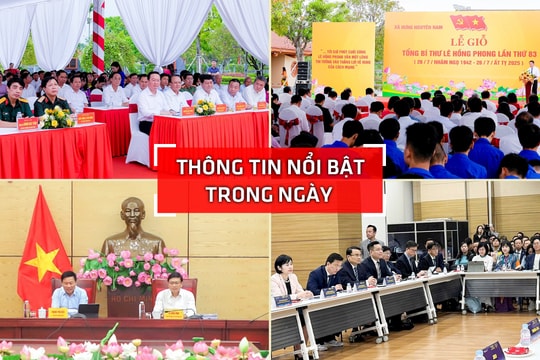
.jpg)

.jpg)
